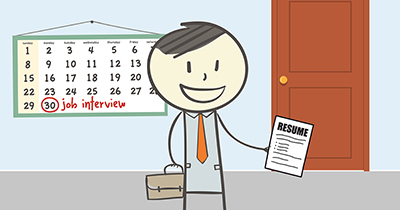Resource Roundup: Resume and Interview Tips
 Once you've decided what kind of work you want to pursue, the next steps on the path to work are writing or editing your resume and preparing for interviews. Knowing what to feature on your resume or say to a hiring manager or recruiter are fundamental to a successful job search. Today's blog post includes tips to ensure that your resume and interview skills create a positive impression as you pursue your career and financial independence.
Once you've decided what kind of work you want to pursue, the next steps on the path to work are writing or editing your resume and preparing for interviews. Knowing what to feature on your resume or say to a hiring manager or recruiter are fundamental to a successful job search. Today's blog post includes tips to ensure that your resume and interview skills create a positive impression as you pursue your career and financial independence.
Resumes
Before you write your resume, take the time to think about your work experience – whether you've had a paid position or done volunteer work. Reviewing your resume will remind you of the skills and qualifications that may make you a good fit for a new role. Or it can help you think about what types of duties and responsibilities you've enjoyed in the past and what type of work interests you have now. Check out these Choose Work! blog posts to help you write or edit your resume:
Volunteering as a path to success
Community service offers the opportunity to develop new skills, gain work experience and develop valuable networking relationships.
After Jesus graduated from college, he started volunteering for Telecare. Through this volunteer work, he realized how much he loved the tasks and responsibilities, as well as the opportunity to help others.
With help from Social Security's Ticket to Work (Ticket) program, Jesus found a way to turn his passion and volunteer experience into a career.
Learn more in Jesus' Ticket to Work success story.
- Resumes: The Key to Opening Interview Doors
- Increase Your Chances for a Job Interview
- Addressing Employment Gaps During a Job Search
Are you looking for work for the first time? If you've done volunteer work or had an internship, that kind of experience can be added to your resume. Learn more about gaining experience and developing skills through community service and internships:
Interviews
It's possible that you'll have several interviews before receiving a job offer. Being prepared, knowing what kinds of questions you're likely to be asked and what types of questions you should ask are key to impressing an interviewer. These Choose Work! blog posts may help you learn what you can expect during an interview, whether it's on the phone or in person:
- Have an Interview? Do Your Homework!
- Can You Hear Me Now? Mastering the Phone Interview
- Look Your Best: How to Dress for a Job Interview
- Top 3 Questions You Can Expect during a Job Interview
- Top Questions You Can Expect during a Job Interview – Part 2
- It’s Your Turn: Questions to Ask During a Job Interview
- The Job Interview: It’s More than What You Say
Job applications and disability
Under the Americans with Disabilities Act (ADA), employers are not allowed to discriminate against a job applicant due to a disability or ask specific questions about your disability during the application or interview process. But this may leave you with questions about talking to a potential employer or new manager about your disability or requesting accommodations. While the decision to disclose your disability is always yours, you can find advice on the Choose Work! blog to help you make the choice that’s right for you.
- Talking about Disability Disclosure
- How to Request Accommodations
- Making Interviews Accessible for You
Working with Ticket to Work
Social Security's Ticket to Work (Ticket) program supports career development for people ages 18 through 64 who receive Social Security disability benefits (SSDI/SSI). Through this free and voluntary program, people who are eligible can work with Ticket program service providers, like Employment Networks (EN) and State Vocational Rehabilitation (VR) agencies to receive supports and services as they pursue work. Many service providers offer help with writing and editing resumes and job interview preparation.
And many ENs have Benefits Counselors on staff who are trained to review all of the state and federal benefits you receive and discuss with you the effect work will have on those benefits. Benefits Counselors can also introduce you to Social Security Work Incentives, which may make it easier for you to transition to work while you continue to receive healthcare and, in some cases, cash payments.
Learn More
To learn more about the Ticket program, call the Ticket to Work Help Line at 866-968-7842 or 866-833-2967 (TTY) Monday through Friday, 8 a.m. to 8 p.m. ET. Ask a representative to send you a list of service providers or find providers on your own with the Ticket program Find Help tool.